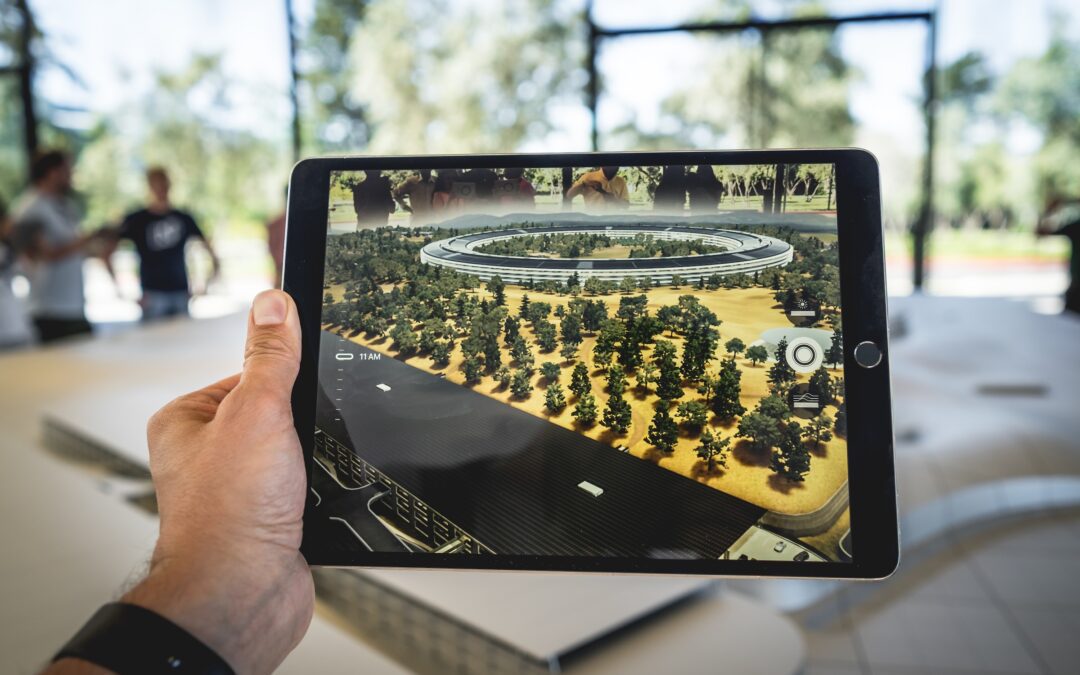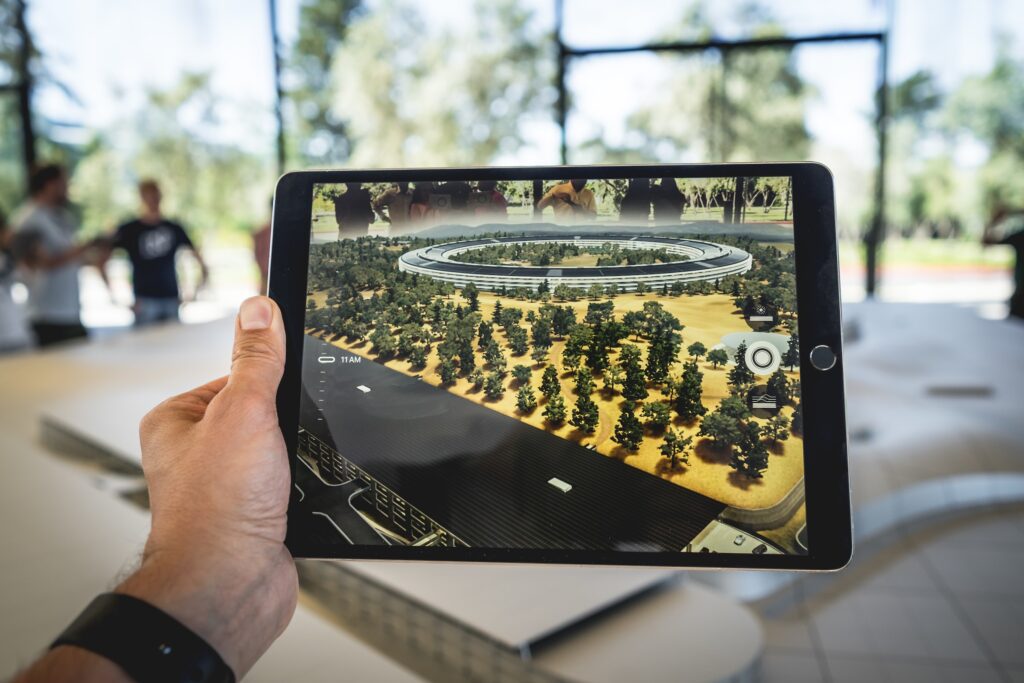
Unleashing the Future: Augmented Reality in Marketing
Elevating Real Estate Marketing to New Dimensions with Augmented Reality
Exploring the Virtual Revolution: Augmented Reality in Marketing

Defining Augmented Reality (AR)
The article presents a lucid understanding of AR, discussing its widespread applications and contrasting it with VR.
AR’s Role in Marketing
The piece explores AR’s transformative impact on marketing, from creating interactive brand experiences to effective storytelling, punctuated with real-world successful campaigns.
Integrating AR
The blog concludes with pragmatic tips for incorporating AR into marketing strategies, emphasizing the importance of choosing the right platform, aligning AR experiences with brand identity, and prioritizing quality.
Understanding Augmented Reality: A New Paradigm
Distinguishing Augmented Reality (AR) from Virtual Reality (VR)
Augmented Reality (AR): Merging Digital with Physical Spaces
Augmented Reality (AR) enriches the real-world environment by overlaying digital information—such as images, sounds, or other data—directly onto our physical surroundings. Imagine exploring a property through AR glasses: you could be standing in an empty room, but with AR, you’re able to visualize it furnished, with detailed annotations and interactive elements enhancing your perception. AR’s power lies in its ability to augment the real world with virtual details, providing potential buyers a comprehensive understanding of properties, from 3D tours of real estate to intricate floor plan creations, without leaving their current location. This integration of digital elements into the physical world makes AR an invaluable tool in real estate website design and property management marketing strategies.
Virtual Reality (VR): Immersive Digital Environments
In contrast, Virtual Reality (VR) transports users into entirely digital environments, creating a fully immersive experience that’s detached from the physical world. With a VR headset, users can find themselves virtually standing in a Parisian café or touring a property located thousands of miles away. VR creates an all-encompassing digital realm, offering users a 360-degree exploration of spaces that might be currently inaccessible. This technology is particularly effective for immersive property showcases and virtual open houses, allowing clients to experience properties in detail, from the textures of materials to the layout of spaces, as if they were physically present.
AR and VR in Real Estate Marketing: Complementary Technologies
While AR brings virtual elements into the real world to enhance the physical environment, VR offers an escape into completely virtual spaces for a comprehensive, immersive experience. Both technologies have transformative applications in real estate marketing. AR allows for interactive floor plans and virtual staging, enabling clients to visualize changes and potential within a real space. VR, on the other hand, facilitates virtual property tours and immersive experiences that can captivate clients, offering them a detailed preview of properties from anywhere in the world.
Leveraging AR and VR, Fortum Digital Services crafts innovative real estate marketing solutions that engage clients, enhance listings, and drive sales. These technologies not only help in showcasing properties in captivating ways but also in providing clients with invaluable insights and interactive experiences, setting new standards in real estate digital solutions.
By integrating AR and VR into marketing strategies, Fortum Digital Services ensures that property management companies and real estate agents can offer prospective buyers and tenants unique and informative experiences that stand out in the competitive real estate market.
AR’s Impact on Marketing: Transformative Strategies
Leveraging AR for Real Estate Excellence
The AR Revolution in Action: Case Studies and Successes
The practical application of AR in marketing has yielded impressive outcomes across the board. For instance, AR’s ability to facilitate virtual try-ons and interactive product demonstrations has significantly enhanced the online shopping experience, a tactic equally beneficial for showcasing real estate properties and related services. Highlighting real-world examples, such as IKEA’s AR app and L’Oreal’s Virtual Makeup Trial, underscores AR’s potential to revolutionize not just real estate marketing but the broader marketing landscape.
Seamless Integration for Immersive Experiences
Crafting Compelling Narratives with AR
At the heart of effective AR marketing is the art of storytelling. AR offers an unprecedented opportunity to tell captivating stories that engage customers on a deeper level. By embedding interactive elements that allow potential buyers to explore properties in detail or visualize changes within a space, Fortum Digital Services leverages AR to craft narratives that resonate with the audience’s desires and aspirations, elevating the standard of real estate marketing.
Technical Excellence and Quality Assurance
Launching into Augmented Reality: Strategic Insights for Real Estate Marketing
Embarking on the journey of integrating Augmented Reality (AR) into your real estate marketing strategy offers a unique opportunity to captivate and engage your audience in unparalleled ways. As you consider incorporating AR into your portfolio, Fortum Digital Services provides essential guidance to ensure your AR initiatives not only captivate but also convert. Here’s how to begin:
• Selecting the Ideal AR Platform for Real Estate
The foundation of a successful AR experience is choosing the right platform. The market offers a plethora of AR platforms, each designed with specific functionalities and strengths. For real estate applications, such as showcasing 3D tours of properties or interactive floor plan creation, it’s crucial to select a platform that not only supports high-quality visuals but also is compatible with your existing digital infrastructure. Assess each platform’s capabilities against your project’s needs—considering factors like usability, scalability, and support for advanced features—to find the perfect match for your real estate marketing endeavors.
• Ensuring Brand Coherence through AR Experiences
For AR to effectively enhance your marketing strategy, it must be a natural extension of your brand. This means creating AR experiences that reflect and amplify your brand’s identity and messaging. Whether it’s through virtual staging in residential real estate or augmented walkthroughs for property management, each AR experience should align with your brand’s ethos, offering a seamless blend of innovation and familiarity that resonates with your audience. Before launching any AR initiative, critically evaluate whether it strengthens your brand narrative and upholds the integrity of your brand identity.
• Audience Alignment: Tailoring AR to Your Market
Understanding your target demographic is pivotal in designing AR experiences that truly engage. The real estate market is diverse, encompassing a wide range of needs and preferences. By tailoring your AR content to address specific audience segments—be it potential homebuyers, investors, or tenants—you ensure that your AR offerings provide value and relevance. Utilize data-driven marketing insights to customize experiences, making every interaction with your AR content a step towards conversion.
• Prioritizing Quality in AR Implementations
The impact of AR hinges on the quality of the experience it delivers. High-quality, immersive AR experiences can significantly enhance customer engagement and satisfaction, leading to higher conversion rates and brand loyalty. Conversely, subpar implementations can detract from the user experience, harming your brand’s reputation. Focus on delivering AR experiences that boast high-quality visuals, intuitive interactions, and reliable performance across devices. This commitment to quality should extend to all facets of your real estate marketing strategy, reinforcing your position as a leader in the adoption of modern technology solutions for property management.
Engagement and Conversion: The AR Advantage
Future-Proofing Marketing with AR
Source: Tim Cook, Founder of Apple, Inc
“Augmented Reality will take some time to get right, but I do think that it’s profound. It will amplify human performance instead of isolating humans. So it’s a big idea like the smartphone.”
Conclusion: AR as a Marketing Revolution
Further Reading: Mastering UX for AR Success
To delve deeper into creating compelling AR experiences, we recommend exploring our guide, “Unlocking Exceptional User Experiences: Mastering UX Design Best Practices for Optimal Website Engagement.” This resource offers valuable insights into enhancing user experience, a critical component of successful AR marketing strategies in the real estate sector.
